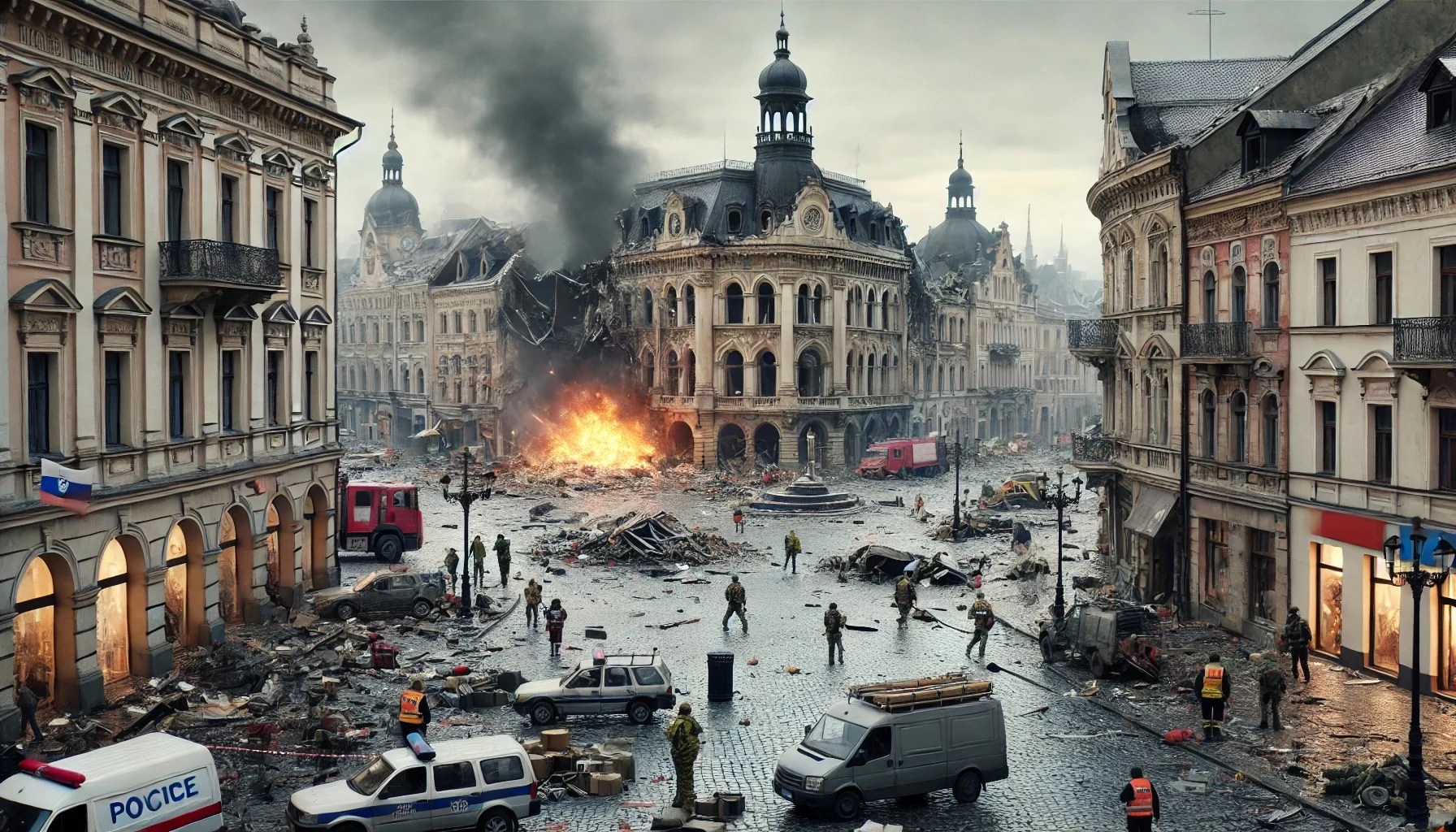
Minsk Independence Day Bombing
by: The Calamity Calendar Team
July 4, 2008
A Celebration Shattered
Minsk, the capital of Belarus, was buzzing with excitement on July 4, 2008. The city was celebrating its Independence Day, a significant event marking the liberation of Minsk from Nazi occupation during World War II. The festivities included a grand military parade, spectacular fireworks, and an outdoor concert that drew thousands to Victory Square. Among the revelers was President Alexander Lukashenko, underscoring the importance of the day.
The atmosphere was electric as the evening unfolded. Families, friends, and tourists filled the square, their faces illuminated by the bright lights and their hearts uplifted by the festive spirit. The concert was in full swing, and the crowd swayed to the music, unaware of the impending danger.
The Explosion
As the clock approached 11:00 PM, the night was suddenly torn apart by a deafening explosion. A homemade bomb, packed with metal fragments, detonated near Victory Square. The device was designed to cause maximum injury, and it succeeded. The joyous celebration was instantly transformed into a scene of chaos and terror.
People screamed and scattered in all directions, trying to escape the smoke and debris. The once-happy crowd was now a panicked mob, with many trampled in the desperate rush to flee the area. The injured lay on the ground, some in shock, others crying out for help.
Thanks for subscribing!
Immediate Response
The response from emergency services was swift and decisive. Medical teams quickly arrived at the scene, providing first aid and transporting the severely injured to nearby hospitals. Firefighters and police officers worked to secure the area and prevent further casualties.
President Lukashenko, who had narrowly escaped harm, stayed on-site, directing the response efforts and reassuring the public. His presence was both a comfort and a rallying point for a city in crisis.
The Aftermath
The bombing left over 50 people injured, including several children. Remarkably, there were no fatalities, but the psychological impact was profound. Minsk, a city known for its resilience, was left grappling with the shock and horror of the attack.
Property Damage
The bomb caused minimal structural damage, as its primary purpose was to injure people rather than destroy buildings. However, the emotional and psychological toll was significant, leaving a scar on the community.
Economic Impact
The economic fallout from the bombing was relatively minor, as it did not target key infrastructure. However, the incident prompted the government to increase spending on public safety and security measures, reflecting heightened concerns about future attacks.
The Investigation
In the aftermath of the bombing, law enforcement agencies launched a comprehensive investigation to find those responsible. Several suspects were arrested in the following weeks, but conclusive evidence linking them to the attack remained elusive. The investigation dragged on for years, with intermittent progress but no definitive answers.
Security Measures
The Belarusian government responded by significantly boosting security at public events. More police and security personnel were deployed, surveillance was enhanced, and new protocols were introduced to prevent similar incidents in the future.
Policy Changes
President Lukashenko vowed to take a hard line against terrorism, leading to stricter laws and increased government oversight. The bombing prompted a thorough review of national security protocols, resulting in more rigorous checks and heightened vigilance.
The Unresolved Case
Despite the efforts of investigators, the Minsk Independence Day bombing remains an unsolved mystery. The identity of the perpetrators and their motives are still unknown, leaving a lingering sense of unease. Each year, the anniversary of the attack is a somber reminder of the unresolved case and the ongoing threat of terrorism.
Public Sentiment
The bombing left a lasting impact on the national psyche. Public events are now approached with a mix of excitement and caution, as the memory of that night remains vivid. Increased security presence at large gatherings is a constant reminder of the potential risks.
Cultural Impact
The attack did not dampen the spirit of Independence Day celebrations, but it did change their nature. The event is now also a time to honor the resilience of those affected and to reflect on the importance of vigilance and unity.
Legacy of the Attack
The 2008 bombing prompted significant changes in Belarusian society. It heightened awareness of security issues and led to more stringent measures to protect public events. The incident is remembered each year, not only for its tragedy but also as a testament to the strength and resilience of the Belarusian people.
The Path Forward
As Belarus continues to move forward, the hope remains that the perpetrators will one day be brought to justice. Until then, the memory of that fateful night serves as a powerful reminder of the importance of vigilance, resilience, and unity in the face of adversity.
Conclusion
The Minsk Independence Day bombing of 2008 remains one of Belarus’ most haunting mysteries. While the physical wounds have healed, the psychological and emotional scars endure. The attack changed the nation’s approach to security and left a lasting legacy on its people. As the investigation continues, the story of that night stands as a poignant reminder of the fragility of peace and the enduring strength of a united community.
Stay in the Loop!
Become a Calamity Insider and get exclusive Calamity Calendar updates delivered straight to your inbox.
Thanks! You're now subscribed.